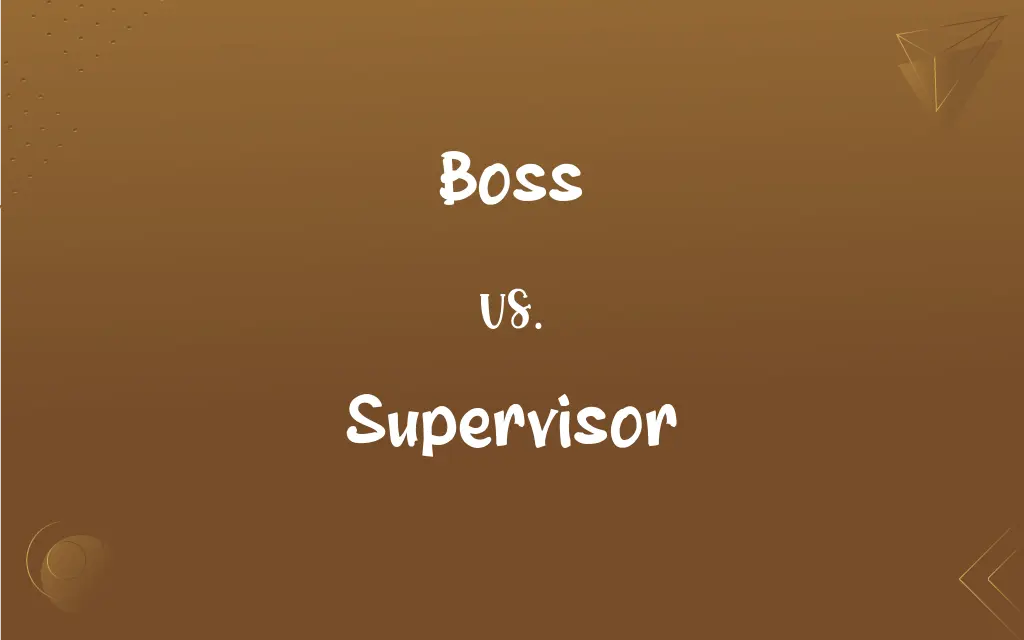Boss vs. Supervisor: What's the Difference?
Edited by Aimie Carlson || By Janet White || Published on February 8, 2024
Boss is a person in charge of a worker or organization. Supervisor is a person overseeing and directing work or workers.

Key Differences
A boss is generally someone with the highest authority within a department or organization, while a supervisor is a managerial role responsible for overseeing the work of employees.
The role of a boss encompasses a wide range of responsibilities, including decision-making on strategic matters, whereas a supervisor focuses more on managing the day-to-day activities of staff.
A boss can make significant decisions such as hiring or firing, setting policies, and strategic planning, while supervisors are often involved in implementing these policies and ensuring the work is completed effectively.
In many organizations, the boss has a broader scope of influence and may not directly interact with all employees regularly, whereas supervisors usually have direct and frequent interactions with the employees they oversee.
The term 'boss' can be used more broadly to refer to anyone in a position of authority, while 'supervisor' is a specific job title that indicates a direct managerial role over staff.
ADVERTISEMENT
Comparison Chart
Level of Authority
Highest in department/organization
Direct managerial authority over staff
Scope of Responsibility
Broad, strategic decisions
Day-to-day management of work
Interaction with Employees
May not interact directly with all employees
Regular, direct interactions with employees
Decision-making Power
Hiring, firing, policy setting
Implementing policies, overseeing work
Usage in Context
Broad term for any authority figure
Specific job title with managerial role
ADVERTISEMENT
Boss and Supervisor Definitions
Boss
The person directly responsible for an employee's work.
My boss approved my vacation request.
Supervisor
A role involving the management of day-to-day activities.
As a supervisor, she regularly conducts team meetings.
Boss
A person who is in charge of an employee or organization.
She is the boss of a successful marketing firm.
Supervisor
A managerial position below the top level.
He was promoted to supervisor last year.
Boss
A leader or head of a group.
He is a tough but fair boss.
Supervisor
A person overseeing the work of others.
The supervisor ensured everyone met their deadlines.
Boss
Someone who makes decisions and exercises authority.
The boss decided to expand the company.
Supervisor
A role responsible for implementing company policies.
The supervisor enforced the new safety protocols.
Boss
A term used to refer to any person in a position of authority.
In this office, your boss will be the one to evaluate your performance.
Supervisor
Someone responsible for guiding and supporting employees.
Our supervisor is very supportive of our professional development.
Boss
An employer or supervisor.
Supervisor
One who supervises.
Boss
One who makes decisions or exercises authority.
FAQs
Is 'boss' a formal title?
No, 'boss' is more informal and can refer to anyone in a leadership position, regardless of their official title.
Can a supervisor be a boss?
Yes, a supervisor can be a boss if they have the authority to make significant decisions.
What are the key responsibilities of a boss?
A boss is responsible for managing employees, making decisions, and ensuring that organizational goals are met.
What qualities make a good boss?
Good leadership, communication skills, fairness, and the ability to motivate and support employees are key qualities.
Can a boss also have a boss?
Yes, most bosses also have higher-level managers or executives to whom they report.
Is it appropriate to call your manager 'boss'?
It depends on the workplace culture; in some environments, it's perfectly acceptable, while in others it might be seen as too informal.
What is the definition of a 'boss'?
A boss is a person who is in charge of a worker or organization.
How does 'supervisor' differ from 'boss'?
A supervisor is specifically someone who oversees and directs the work of others, while a boss is a more general term for anyone in a position of authority.
How do I address a boss in an email?
It's usually best to address them by their name or title, such as "Mr./Ms. [Last Name]" or their formal job title.
What's the difference in authority between a boss and a supervisor?
A boss generally has broader authority in the organization, while a supervisor's authority is usually more limited to specific teams or projects.
Are there different types of supervisors?
Yes, there are various types, including line supervisors, team leaders, and department managers, each with different specific roles.
What does a supervisor typically do?
A supervisor oversees the day-to-day operations, guides employees, and ensures tasks are completed efficiently.
Can 'boss' and 'supervisor' be used interchangeably?
In some contexts, they can be used interchangeably, but 'supervisor' often implies a more hands-on managerial role.
How should I approach a supervisor with a problem?
Approach them respectfully, clearly state the issue, and, if possible, propose potential solutions.
How does one become a supervisor?
Typically, through a combination of work experience, demonstrated leadership abilities, and often through internal promotion.
What challenges do bosses face?
Challenges include managing diverse teams, handling conflicts, making tough decisions, and balancing organizational goals with employee needs.
What's the best way to give feedback to a supervisor?
Offer feedback respectfully and constructively, focusing on specific issues and suggesting improvements.
What qualities are important for a supervisor?
Strong leadership, communication skills, attention to detail, and the ability to mentor and guide employees are important.
Is a team leader the same as a supervisor?
Not always; a team leader may not have the same level of authority or responsibility as a supervisor.
How do I become a good boss?
Gain experience, develop strong interpersonal skills, learn about effective management techniques, and understand the needs of your team.
About Author
Written by
Janet WhiteJanet White has been an esteemed writer and blogger for Difference Wiki. Holding a Master's degree in Science and Medical Journalism from the prestigious Boston University, she has consistently demonstrated her expertise and passion for her field. When she's not immersed in her work, Janet relishes her time exercising, delving into a good book, and cherishing moments with friends and family.
Edited by
Aimie CarlsonAimie Carlson, holding a master's degree in English literature, is a fervent English language enthusiast. She lends her writing talents to Difference Wiki, a prominent website that specializes in comparisons, offering readers insightful analyses that both captivate and inform.







































































